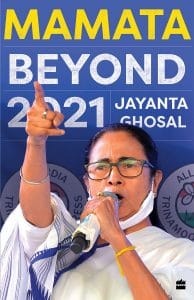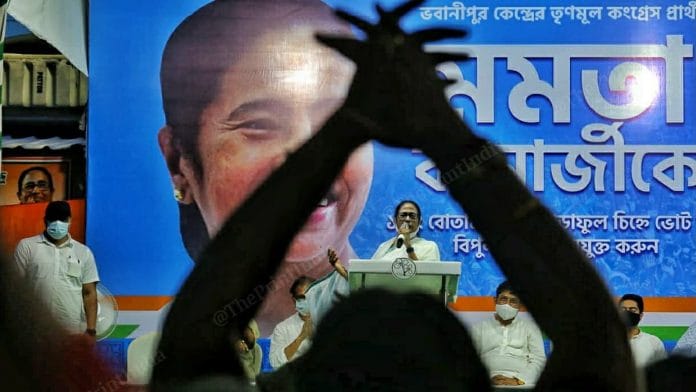During the 1984 elections, Mamata dreamt her father was telling her: ‘You’ll win, and not just that, you’ll go much farther. You won’t remain where you are today.’ Mamata always claims that everything unexpected in her life is through divine intervention. Before the 2016 elections, there were special pujas and yajnas in Mamata’s house. She also has deep faith in the god Jagannath of Puri. However, she didn’t manage to visit the temple there at the time, although she’d meant to. The trip to Puri did not materialize for various reasons. A plan was indeed made, but there was no enthusiasm on the part of Odisha Chief Minister Naveen Patnaik. In any case, Naveen Patnaik is something of an atheist. But the principal priest of the temple did visit Mamata at home before the voting began. Mamata conducted a special yajna at her home in Kalighat with the help of ten priests. The special rituals went on for hours. She felt a greater sense of certainty after they were completed; she was sure no one would be able to harm her.
On one occasion, Mamata was in Delhi on a visit related to politics. Her mother was alive then. Mamata dreamt that she was praying at Tirupati. It had been a long time since she had done this. Back in Kolkata she told her mother of her dream. Her mother said in surprise, you know, an unknown old woman came here a few days ago to say, ‘Ma, tell your daughter to pray at Tirupati.’ Needless to add, Mamata did go to Tirupati after this.
One more story. Mamata’s personal secretary Ratan Mukherjee had been to Bangalore in connection with his daughter’s studies. On the way back he brought Mamata a sandalwood figure of the Buddha as a gift. Mamata put it in her tiny bedroom. This small room in Kalighat has all kinds of figures of deities. It even has a shawl from Ajmer Sharif on which the figures rest, including one of Jesus Christ and this one of the Buddha. Once, a political colleague said he wanted to take the Buddha. Mamata agreed. But try as he might, using all his strength, he apparently could not dislodge the figure from its place. Then he said, perhaps the Buddha does not wish to leave. Such is the intensity of Mamata’s faith.
So, while on the one hand, Mamata’s success has been shaped by a harsh and unflinchingly militant political agitation, during which she has never been afraid of facing violence, on the other, she reposes deep faith in supernatural forces. She believes that the goddess Kali or some sort of divine power controls her from the background.
I remember a scene from the film Herbert, in which photographs of Charu Mazumdar and of the goddess Kali hang on a wall. This doctrine of power is probably connected to violent political struggle in some way or the other in the Bengali psyche. Mamata has travelled along the path of personal struggle to the political one, but her unquestioning, implicit faith and dependence on divine forces has remained a constant refrain in her life.
Mamata Banerjee did not become Mamata Banerjee overnight. To trace the roots of the confidence that has got her to Nabanna from Kalighat, we have had to revisit her life, from childhood and growing up to joining student politics, and her courage through it all. She had fought after she was born and she was born to fight.
Also Read: Not Modi, but Mamata and Kejriwal is the David-vs-David fight to watch before 2024
When Mamata Banerjee defeated Somnath Chatterjee in 1984, it was literally the story of a girl from a lower middle-class family living in a hut on the bank of the Adiganga creek in Kolkata going all the way to Parliament House in New Delhi. Even by the standards of Indian politics, it was no ordinary achievement
In 2021, the BJP was desperate to come to power in West Bengal, and had applied the four Chanakyan principles of saam, daam, dand, bhed—persuade, purchase, punish, exploit weaknesses. But Mamata had told me: ‘Keep calm and watch.’ The elections revealed her political sagacity
We are not allowed, or inclined, to destroy the images of national or popular leaders and of celebrities that the media culture has established. But the truth is that, like you and me, political leaders also have several layers to them.
My first encounter with Mamata Banerjee was in 1984. Even after all these years, her political DNA has remained unchanged. And watching her from up close again during the 2021 Assembly elections, thirty-seven years later, I have realized that her political acumen and the ability to read the electorate is beyond doubt. As she said once: ‘I can tell the pulse of the people at a gathering by looking at their eyes.

This excerpt from ‘Mamata: Beyond 2021′ by Jayanta Ghosal and translated by Arunava Sinha has been published with permission from HarperCollins India.






